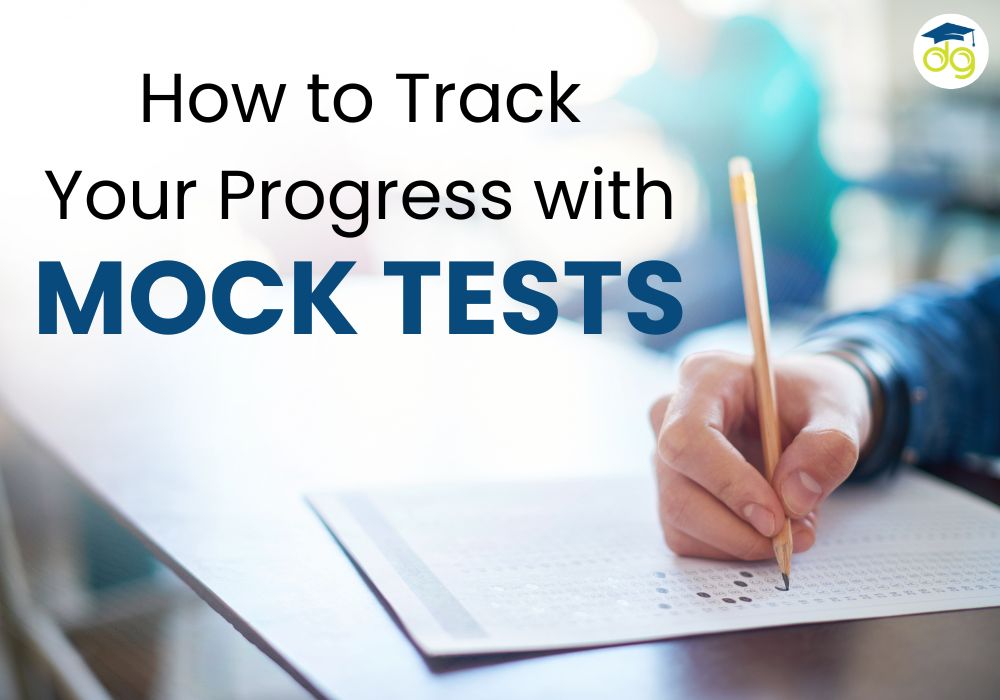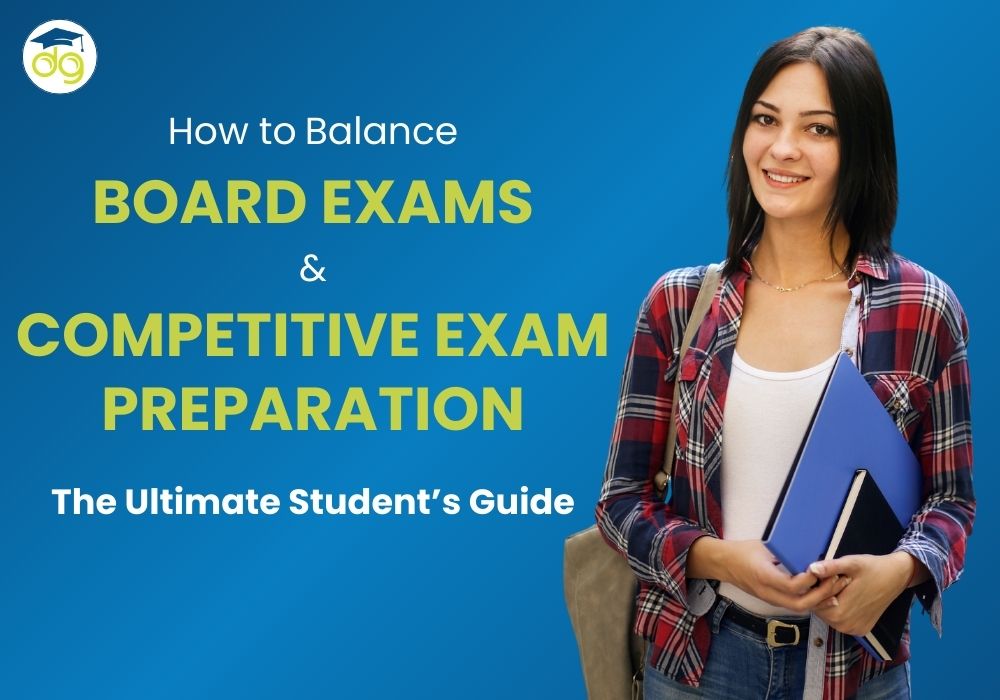How to Balance Board and Competitive Exam Prep Effectively
Smart strategies to manage board exams and crack JEE, NEET, CLAT, CUET
For students in 11 and 12, the pre-exam months can be crazy. On one hand are school-graduation-ending board exams and scholastic grades. On the other hand, extremely competitive college-entering entrance exams such as JEE, NEET, CUET, CLAT, and IPMAT determine admissions to college and the future ahead.
Each of the exams requires a unique preparation strategy, and there is limited study time to devote. Stress at each can lead to a condition of confusion, burnout, and poor performance—unless strategically managed.
This blog teaches you how to strategise a working and flexible system that integrates board and entrance examination preparation in a proper way.
Why Combine Board and Competitive Exam Preparation
1. Overlapping Syllabus
Much of the syllabus for exams such as JEE, NEET, and CUET overlaps with board syllabi, particularly in Physics, Chemistry, Biology, and Mathematics. Sticking to the NCERT books is a good idea for both.
2. Concept Reinforcement
Board exams test a thorough understanding and a written explanation. Competitive exams test application, logic, and speed. Learning the same concept in different formats reinforces recall and enhances flexibility.
3. Efficient Time Use
Rather than reading the same chapters individually for various exams, combined preparation eliminates repetition and wastage of time.
Stream-Specific Strategies
JEE (Joint Entrance Exam)
- Emphasis on concept building and application-based problem-solving in Physics, Chemistry, and Mathematics.
- Study books like NCERT, H.C. Verma, I.E. Irodov, R.D. Sharma, and last year question papers.
- Do weekly mock tests on speed.
NEET (National Eligibility cum Entrance Test)
- Emphasis on the NCERT for Chemistry and Biology; practice NEET MCQs from objective books.
- Study diagrams, processes, and facts again.
- Increase accuracy with the simulation of tests on a regular basis and verification of the errors.
CUET (Common University Entrance Test)
- Focus subject-based subjects, language skills, and general knowledge.
- Regularly practice reading comprehension, grammar, reasoning, and current affairs.
- Completely master the Class 12 NCERT.
CLAT (Common Law Admission Test)
- Focus on reading comprehension, analytical reasoning, legal aptitude, and current affairs.
- Practice daily newspaper reading and time-based simulated tests.
- Increase the skill to apply legal principles and logical conclusions.
IPMAT (Integrated Program in Management Aptitude Test)
- Develop logical, verbal, and quantitative abilities.
- Vocabulary, data interpretation, and mental calculation are the areas which count.
- Improve speed through sectional practice tests.
Daily and Weekly Study Timetables
JEE + Board Daily Study Timetable
Time | Activity |
| 6:00 AM | Wake up, light exercise, breakfast |
| 7:00–9:00 AM | JEE Physics or Maths (MCQs + problem-solving) |
| 9:00–11:00 AM | Board Chemistry (theory + written practice) |
| 11:00–11:30 AM | Short break |
| 11:30–1:00 PM | JEE Chemistry (numerical + short notes) |
| 1:00–2:00 PM | Lunch and rest |
| 2:00–4:00 PM | Board Physics or English (long answers) |
| 4:00–4:30 PM | Snack + walk |
| 4:30–6:00 PM | JEE Maths or Physics problems |
| 6:00–7:00 PM | Board revision (sample questions) |
| 7:00–8:00 PM | Dinner |
| 8:00–9:30 PM | Light revision, mock paper review |
| 9:30–10:00 PM | Plan the next day, relax |
| 10:00 PM | Sleep |
NEET + Board Daily Study Timetable
Time | Activity |
| 5:30 AM | Wake up, quick biology revision |
| 6:00–8:00 AM | NEET Biology MCQs + notes |
| 8:00–9:30 AM | Board Chemistry theory + diagrams |
| 9:30–10:00 AM | Break |
| 10:00–12:00 PM | NEET Chemistry (MCQs + formula recap) |
| 12:00–1:00 PM | Board English / Optional subject |
| 1:00–2:00 PM | Lunch + short nap |
| 2:00–4:00 PM | NEET Physics (concepts + problems) |
| 4:00–4:30 PM | Break |
| 4:30–6:00 PM | Board Biology answer writing |
| 6:00–7:00 PM | Light NEET revision (flashcards, mistakes log) |
| 7:00–8:00 PM | Dinner |
| 8:00–9:30 PM | Past paper questions |
| 9:30–10:00 PM | Plan + sleep |
CLAT + Board Exam Daily Timetable (Class 12 – Humanities/Commerce)
Time | Activity |
| 6:30 – 7:00 AM | Wake up + light exercise |
| 7:00 – 8:30 AM | CLAT Current Affairs + Newspaper Reading |
| 8:30 – 9:30 AM | Breakfast + get ready for school |
| 9:30 – 3:30 PM | School Hours (Board Subject Learning) |
| 3:30 – 4:00 PM | Snack + Rest |
| 4:00 – 5:00 PM | Board Subject 1 (e.g., Economics, Business Studies) |
| 5:00 – 6:00 PM | CLAT Legal Reasoning Practice |
| 6:00 – 7:00 PM | Board Subject 2 (e.g., Political Science, Accountancy) |
| 7:00 – 8:00 PM | Dinner + Relax |
| 8:00 – 9:00 PM | CLAT Logical Reasoning or English (RC, Vocabulary, Logic) |
| 9:00 – 9:30 PM | Flashcards or Note Revision (CLAT or Board Topics) |
| 9:30 – 10:00 PM | Plan Next Day + Wind Down |
| 10:00 PM | Sleep |
CUET + Board Exam Daily Timetable
Time | Activity |
| 6:00 – 6:30 AM | Wake up + light stretch |
| 6:30 – 8:00 AM | CUET English + General Test (Reading, Logic, Reasoning) |
| 8:00 – 9:00 AM | Breakfast + Get Ready |
| 9:00 – 3:00 PM | School Time (Focus on Board Subjects) |
| 3:00 – 3:30 PM | Short Break |
| 3:30 – 4:30 PM | Board Subject Revision (e.g., Accountancy, Biology) |
| 4:30 – 5:30 PM | CUET Domain Subject Prep (e.g., Physics, History) |
| 5:30 – 6:00 PM | Snack + Light Break |
| 6:00 – 7:00 PM | CUET Mock Sectional Practice (Mixed topics) |
| 7:00 – 8:00 PM | Dinner + Family Time |
| 8:00 – 9:00 PM | Board Subject Writing Practice (Long Answers, Diagrams) |
| 9:00 – 9:30 PM | Flashcard Review (Formulas, Definitions) |
| 9:30 – 10:00 PM | Plan Tomorrow + Light Reading |
| 10:00 PM | Sleep |
Weekly Study Plan (All Streams)
Monday to Friday
- 4 subjects per day: 2 board subjects, 2 competitive topics
- Mix theory, MCQ, and writing formats
- 1–2 hours daily of revision
Saturday
- Half-day mock test (alternate between board and competitive)
- Afternoon analysis and revision
Sunday
- Rest in the morning or do light reading.
- Self-testing, doubt resolution
- Plan for next week
Techniques to Stay Consistent
- Time Blocking: Fix hours for specific topics and stick to them.
- Microgoals: Target chapters, not books. Finish 1 chapter per subject per week.
- Mock Test Feedback Loop: Take one test per week and analyse it thoroughly.
- Weekly Check-in: Identify missed goals and adjust the upcoming plan.
- 90-minute Focus Blocks: Study in chunks with 5–10 minute breaks.
- Distraction Elimination: Use productivity apps to stay off social media during study blocks.
Common Mistakes Students Make
- Ignoring Board Exam Writing Practice
Writing skills matter in board exams. Many students focus only on MCQs and neglect the structured answer-writing required by boards.
- Starting Too Late
Procrastination is common. Students often wait for the “right time,” which rarely comes. Starting early and progressing gradually is more effective.
- No Balance Between Subjects
Over-prioritising one subject (like Maths or Biology) at the cost of others often leads to lopsided performance.
- Neglecting Mock Test Review
Taking a mock test is only half the job. Analysing mistakes and adjusting strategy is where improvement really happens.
- No Flexibility in the Schedule
Rigid timetables that don’t adapt to changing school work or test performance cause stress. Schedules must evolve.
How to Prioritise When Time Is Limited
Step 1: Identify High-Weight Chapters
Use the past year's board and entrance papers to shortlist chapters that frequently appear.
Step 2: Focus on Overlapping Topics
If time is tight, double down on chapters that appear in both board and entrance exams—like Organic Chemistry, Electromagnetism, Reproduction, and Arithmetic.
Step 3: Use the 80/20 Rule
Spend 80% of your time on the 20% of content that gives the most returns—high-scoring, conceptual, and commonly asked topics.
Step 4: Practice Smart, Not Just Hard
Solve topic-wise previous year papers. Use mock test results to revise only what’s weak instead of revisiting everything.
Final 2-Month Strategy
- 60 days left: Prioritise board exams, but don’t stop competitive revision.
- 30 days left: Final board revision + mock test loops.
- Last week: Calm, light recap of important notes and formulas. Focus on rest and readiness.
Key Tools and Resources
- NCERT Textbooks (Class 11–12 for all streams)
- Previous Year Papers (Board + competitive)
- Mock Test Platforms: NTA, Consortium of CLAT, CUET Samarth, BYJU’S, Career Launcher
- Note Apps: Evernote, Notion, Trello
- Flashcards & Spaced Revision Tools: Anki, Quizlet
- Pomodoro Apps: Forest, Focus To-Do
Frequently Asked Questions (FAQ)
Q1: Can I crack JEE/NEET while studying for boards?
Yes. With an integrated strategy and hardworking efforts, the majority of students achieve both. Use the board study as a foundation and study competitive speed and accuracy together.
Q2: How many hours do I need to study daily?
6–8 hours of intense study each day is preferable. Focus more on consistency and less on intensity.
Q3: Do I have to study boards and entrance subjects separately?
No. Where possible, combine. Practice for entrances and revise for boards.
Q4: How many mock tests must I do?
Once a week, per type of test is best. Increase to two a week, four weeks before the test.
Q5: What if I fall behind my timeline?
Replan instantly. Avoid cramming. Prioritise core topics and change your mock and revision cycle.
Q6: How do I stay motivated in such a long process?
Small goals. Check your progress every week. Stay connected with peers or mentors. Treat yourself at milestones.
Q7: Will performance at school be helpful in CUET/CLAT/IPMAT?
Yes. CUET and IPMAT both feature the same subject topics as your school course. Good board preparation is directly helpful. For CLAT, good reading and general awareness—usually developed from academics—are strengths.
Categories
Archives
Similar Posts

Study Abroad Application Timeline: Step-by-Step Guide for Indian Students
by Skoodos Bridge

Why Study MBBS in Russia? Fees, Top Universities & Eligibility 2025
by Skoodos Bridge

SSC CGL Cutoff Trends: 5-Year Analysis & 2025 Expectations
by Skoodos Bridge

MBBS Abroad vs MBBS in India: Complete Comparison for Indian Students
by Skoodos Bridge

Top 10 Countries for Indian Students to Study MBBS Abroad in 2025
by Skoodos Bridge


Balancing Coaching Classes & Self-Study: Smart Tips for Students
by Skoodos Bridge

DSSSB 2025 Teaching Exam: Latest Updates & Prep Strategy
by Skoodos Bridge



Leave a Comment